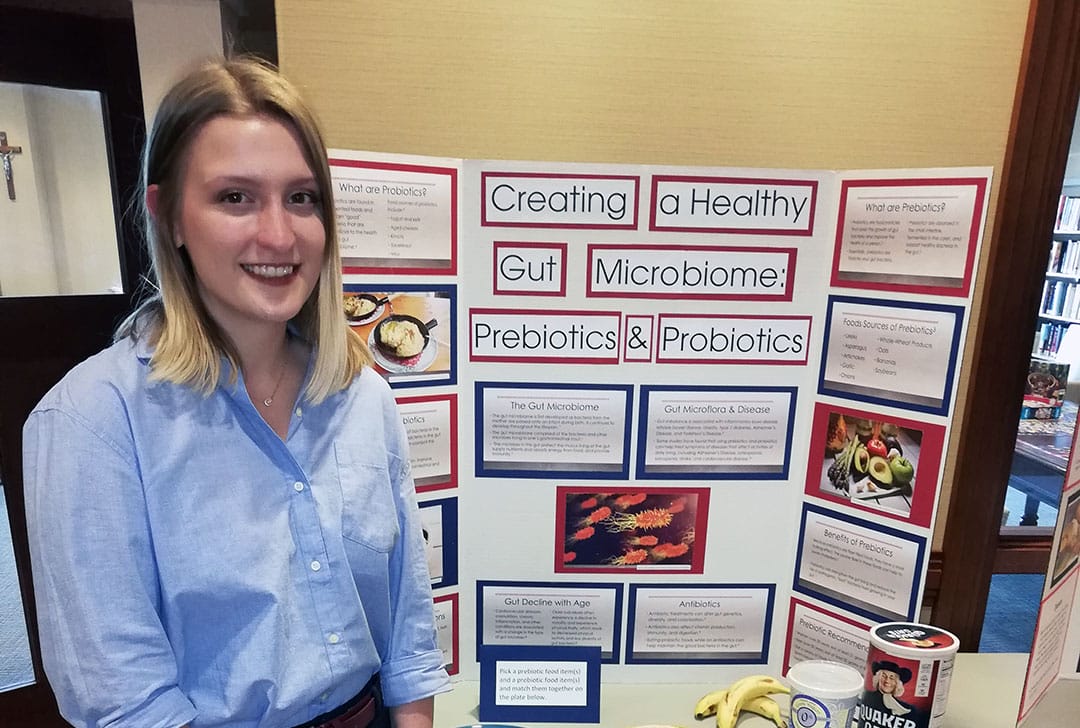Program Mission
The mission of the undergraduate Health Education and Promotion major program is to provide and promote a high-quality education for preparation of competent future health educators and leaders. Preparation includes development of evidence-based comprehensive knowledge and applications to assess community resources and needs, and to plan, implement and evaluate health programs within diverse populations. Through education and engagement, this major fosters the development of sustainable health solutions and health equity to advocate and strengthen the health of local and global communities.
Program Objectives
Upon completion of the major in Health Education and Promotion, the student will successfully:
- Assess, plan, design, implement, administer, and evaluate health education and promotion programs.
- Demonstrate evaluation and use of scientific information and research for evidence-informed practice.
- Demonstrate effective oral and written communication skills.
- Demonstrate an understanding of the beliefs, values, and behaviors for professional practice.
- Demonstrate critical-thinking skills.
What is the outlook for Health Educators?
There is a strong job outlook. According to the Bureau of Labor Statistics (BLS) Occupational Outlook Handbook, “projected employment for health educators is expected to increase at the rate of 7 percent by 2032, at a rate faster than the national average for all occupations in the U.S. The BLS attributes this growth to efforts to improve health outcomes and reduce health care costs through health and nutrition education. The Chicago-Naperville-Elgin, IL-IN-WI region is the 8th highest region for employment of health educators in the country.”
What careers are available with a degree in Health Education and Promotion?
Health educators focus on teaching people and the public how to get and stay well. Health educators work in a variety of settings, including:
- Community and public health agencies
- Health care and medical institutions
- School (K-12) and college/universities health services
- Military
- Companies or corporations with worksite wellness facilities
Students are encouraged to visit the NCHEC website to view job descriptions and learn more about professional certification.
Here is an example of some courses you may take in the Health Education and Promotion program:
- Community Health and Nutrition Programs
- Health Education Planning
- Management of Health Initiatives
- Nutritional Science
- Health Coaching
Health Education and Promotion courses (HLED)
Courses include: NUTR
Lisle undergraduate course descriptions
Mesa undergraduate course descriptions
Students pursuing this major will need to complete general electives to fulfill the University requirement for 120 credit hours toward graduation. A student earning a major in Health Education and Promotion can also complete a major in Nutrition and Dietetics (Lisle only) or Nutrition and Allied Health (Mesa only) programs. Or, students are encouraged to pursue a minor, such as a minor in Nutrition and Food Sciences. Examples of other complementary minors include Personal Fitness (Lisle), Strength and Conditioning (Lisle), Sports Management (Lisle), Communications, Entrepreneurship, Management and Organizational Behavior, Psychology, and Spanish.
Become a Certified Health Education Specialist: Your Path to Making a Difference
The Health Education and Promotion major prepares you to pursue the prestigious Certified Health Education Specialist (CHES) credential. This nationally recognized certification, awarded by the National Commission for Health Education Credentialing (NCHEC), validates your expertise and unlocks a world of rewarding career opportunities.
CHES professionals are agents of change. They empower individuals and communities to adopt healthy behaviors and improve their overall well-being. Through program development, implementation, evaluation, and effective communication, they play a vital role in promoting health, reducing disease risk, and creating positive change.
Benedictine University’s Health Education and Promotion program equips you with the essential skills and knowledge to excel as a CHES. You’ll gain comprehensive understanding and practical experience in:
• Assessing community health needs and resources
• Developing and implementing effective health education programs
• Evaluating program impact and refining strategies for improvement
• Coordinating and providing health education services
• Communicating health information effectively to diverse audiences
• Collaborating with stakeholders to create sustainable health initiatives
Our unique focus on nutrition for risk reduction sets us apart. You’ll gain valuable knowledge about the crucial interplay between nutrition and health, empowering you to guide individuals towards healthier dietary choices for disease prevention and overall well-being.
By pursuing the CHES certification through our program, you’ll not only acquire valuable credentials but also gain the confidence and skills to make a lasting impact on the lives of others. Choose Benedictine University’s Health Education and Promotion program and embark on a journey of professional growth, personal fulfillment, and impactful change in the field of health education.
Master’s Degree Jumpstart: Undergrads Can Take Select Graduate Courses
With planning and permission, Health Education and Promotion majors can take select 5000-level graduate courses to partially fulfill requirements for the Master of Science in Nutrition and Wellness or Master of Public Health programs. This “4+1” option allows qualified seniors with a 3.0 GPA to take 1 graduate Nutrition course or 3 graduate Public Health courses as electives. Completing these courses does not guarantee graduate program admission, which requires a separate application. Students interested in the 4+1 option with the Public Health degree should contact the relevant department chair.


